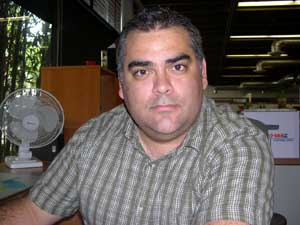-
- Proposed same-sex marriage ban advances in Mass.
- Lesbian’s patience pays off with new DP benefits
- Former general backs ‘Don’t Ask, Don’t Tell’ policy change
- The next step: Big fetes or small affairs for same-sex couples?
- Club that supports gay and lesbian teens meets hostility in Okeechobee
- Lawrence considers gay and lesbian partnership registry
- National News Briefs
- World News Briefs
san diego
Zogby poll: 73 percent of servicemembers are comfortable with gay colleagues
Former Joint Chiefs of Staff chair echoes poll’s findings in op-ed piece
Published Thursday, 04-Jan-2007 in issue 993
Seventy-three percent of servicemembers in a recent poll said they felt comfortable around gays, lesbians and bisexuals, and 78 percent reported that the inclusion of gays, lesbians and bisexuals in the military would not avert their intentions to enlist.
The Zogby International poll, conducted in conjunction with the Michael D. Palm Center and released Dec. 18, tapped a diverse sample of 545 U.S. military personnel who served in Iraq and Afghanistan.
A dissident former general echoed the findings of the Zogby poll in an op-ed piece published in The New York Times on Jan. 2. General John Shalikashvili voiced his displeasure with the military’s “Don’t Ask, Don’t Tell” policy banning gays, lesbians and bisexuals from serving openly. He further corroborated his logic by citing 24 foreign militaries that have maintained morale and effectiveness while allowing gays, lesbians and bisexuals to serve openly. Shalikashvili is the highest ranking general to call for the legislative repeal thus far.
Adding to the slew of retired veterans and high-ranking officials urging Congress to revisit the policy, former Secretary of Defense William Cohen, who served under President Bill Clinton, referred to the exclusion of gays, lesbians and bisexuals from the military as a “a policy of discrimination” on CNN Jan. 2.
Despite this recent galvanic wave of recommendations from sage military leaders as a signal of major change in military policy, local sentiments on the subject caution that such a shift is unlikely to occur this year.
Sean Wherley, public policy director for The Center, believes it is unlikely the “Don’t Ask, Don’t Tell” policy will be repealed in the 110th Congress because other issues like health care, the Iraq war, immigration and Social Security will consume much of Congress’ time.
“Congressional hearings may be held this year to discuss the ban and raise awareness of legislation that seeks to overturn the policy,” he added.
Such hearings would take place under the permission and direction of Sen. Carl Levin, D-Mich., the likely successor to chair the Senate Armed Services Committee. Levin was given a grade of 78 percent by the Human Rights Campaign (HRC) on GLBT issues and was instrumental in revealing the Department of Defense’s surveillance of “Don’t Ask, Don’t Tell” protestors on college campuses last year.
The changing of the guard in the House will be a key factor in discussing a more inclusive military policy. Rep. Duncan Hunter, a staunch Republican and 2008 presidential hopeful from Alpine, will no longer preside as chair of the House Armed Services Committee due to the Democratic majority. For advocates of change to the “Don’t Ask, Don’t Tell” policy, this transition is a good thing because Rep. Hunter refused to hold any hearings during his tenure on the Military Readiness Enhancement Act (MREA), a piece of legislation stipulating the ban lift. It was introduced last year by Rep. Mark Meehan, D-Mass., who has recently announced his plans to reintroduce the bill when Congress convenes this month.
Ben Gomez, president of the local chapter of American Veterans for Equal Rights (AVER), also treaded lightly when discussing swift change in the military.
“To have a repeal this year, there would be a lot of political strategy on all parties involved,” he said. “If the Democrats go full throttle with efforts for a repeal, it could cause another rift among the parties. President Bush is doing his best to save whatever legacy he may have, so I don’t see him signing any bill.”
Gomez estimated that it would take a majority of the Republicans in both houses to get the ban lifted but said he believes the ban will likely dissolve by 2010.
San Diego is home to six military bases and more than 42,000 military personnel, 7,000 of whom are civilians. This is precisely why organizations like The Center, Momentum San Diego and AVER are working both legislatively and publicly to lift the ban in a reasonable amount of time.
“Locally, AVER is a member of Momentum San Diego,” Gomez said. “Momentum is preparing to have San Diego citizens talk to their congressional representatives at their district offices about the removal of ‘Don’t Ask, Don’t Tell.’”
The Center is also a member the Momentum San Diego coalition. Gomez believes the ban is endemically flawed for reasons that most people are not aware of.
“The law specifically states that gay servicemembers cannot disclose their sexual orientation, but there is no language restricting the government from asking,” Gomez said. He warned that “witch hunts continue to this day” and cited a story from a Servicemembers Legal Defense Network client as an example.
“A male sailor had a photo of him [the client] with his arms around another man,” Gomez said. “An investigation was initiated and the sailor was eventually discharged. The government said the photo was enough evidence. The photo was the sailor’s cousin. Also, this sailor was straight. Any servicemember is vulnerable to this law.”
For more information about attending sessions that identify and train people who are willing to meet with or contact their U.S. representative to ask them to repeal the ban, contact Wherley at (619) 692-2077 or swherley@thecentersd.org. The next training session is scheduled for Feb. 3 in North County.
|
|
Copyright © 2003-2025 Uptown Publications


